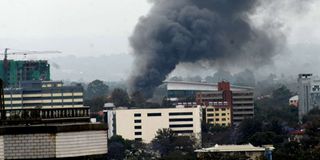Premium
Westgate attack: Seven years later, we’ve made progress

Westgate Mall on fire on September 23, 2013.
What you need to know:
- The September 21, 2013 terror attack was the first known Al-Shabaab siege in Kenya, posing a major security headache.
- Kenyan intelligence officials further argue they have over the years registered successes in intercepting suspected terrorists and uncovering plans, potentially preventing more attacks.
Security expert Clinton Lagoon Obong’o says including private security firms is a boost to the fight.
Reflections on a terror attack at Nairobi’s Westgate Mall, seven years ago today, are incomplete without revisiting what was largely seen as a bungled response by security agencies during the four-day siege.
In his updates — some of which were incredible and embarrassing—Interior Cabinet Secretary Joseph ole Lenku assured the grieving nation that the situation was under control and there was an “insignificant” number of deaths. It turned out that 67 people from 13 countries perished in the Al-Shabaab attack.
This week, Mr Lenku, who is now Kajiado Governor, did not immediately respond to Sunday Nation enquiries on his thoughts about the terror attack seven years later.
But speaking last year to Citizen TV, Mr Lenku said:
“In the face of all the insults and innuendos, I knew I was giving my country my all. It didn’t quite bother me, the sideshows, the accusations, the burning mattresses story. The most important thing to me was that Kenya wins against terrorists.”
However, underneath this were issues like lack of preparedness and coordination for such an attack — including rivalry among security agencies
“Westgate was a wake-up call to Kenyans. Considering the dynamism and changing faces of terror attacks, Westgate got the country – particularly the security agents – thinking of how to deal with the latest terror phenomenon — siege attack,” says Brian Mutie, a commentator on governance and security affairs.
The September 21, 2013 terror attack was the first known Al-Shabaab siege in Kenya, posing a major security headache. Some senior security and intelligence officials who spoke to the Nation in confidence said crucial lessons have since been learned from the mistakes made at the time.
Strategy and legislation
“A lot has changed in terms of strategy, legislation and capacity. You will agree with me that last year’s Dusit-D2 (complex) attack was better coordinated. We arrived at the scene in under 30 minutes, neutralised (killed) the attackers and ended the siege within 24 hours,” says the top security officer.
Kenyan intelligence officials further argue they have over the years registered successes in intercepting suspected terrorists and uncovering plans, potentially preventing more attacks.
Mr Mutie concurs that progress has indeed been made. He singles out increased collaboration and budgetary allocation for terrorism-prone countries in the Horn of Africa region, including Kenya.
On the legislative front, Parliament passed the controversial Security Laws (Amendment) Bill 2014 and the Private Security Act (2018) which, according to experts, have complemented anti-terrorism efforts.
Security expert Clinton Lagoon Obong’o says including private security firms is a boost to the fight.
“Our staff have been undergoing vetting by government and the process was only disrupted in March due to the outbreak of the coronavirus,” says Mr Obong’o, the Managing Director of Background Checks Security and Investigations Limited.
So far, hoteliers, managers of malls and officers from other private institutions have also been part of the security process.
Noting that terrorists thrive on publicity, Mr Obong’o separately observes that sieges give terrorists the attention they want.
Siege attacks
Mr Obong’o, a forensic criminologist, further says such attacks are much easier and less costly to execute.
Siege terrorist attacks are particularly commonplace in Somalia, the latest having been staged only last month, at the beachfront Elite Hotel in Mogadishu.
Going by Somalia instances, siege attackers ordinarily start by detonating a car bomb at the gates of a targeted facility, with the armed militia gaining entry in the confusion and firing aimlessly.
Mr Ahmed Adan, a Mogadishu-based security analyst, regrets that Somalia has not handled such attacks well. “It is true that Somali security forces have a reputation of ending sieges quicker than the Kenyan counterparts.
Erection of barriers
However, such operations have claimed lives of many innocent people who would have otherwise been rescued. Our forces are yet to learn lessons from such mistakes,” Adan told the Nation in a phone interview.
Nonetheless, the frequency of attacks in the Somali capital is much higher and the Federal Government has over the years invested heavily in counter-intelligence operations, installation of bunkers in hotels, erection of barriers in front of hotels and roadblocks within the city.
During the recent attack at the Elite Hotel, for instance, a local MP, Abdullahi Mohamed Nuur, alongside other officials survived by hiding in the hotel’s bunker.
Despite their spirited efforts to secure their countries, few appreciate efforts of the uniformed officers.
Soldiers, argues Mr Mutie, “do not seek sympathy from the public because it is a calling… and they know the ultimate price has to be paid at some point”.
Nevertheless, the security analyst says security agencies must constantly remain vigilant.
Meanwhile, Mr Obong’o says Kenya needs to watch three things that risk eroding the gains made so far — corruption, lack of patriotism and a liberal Judiciary.
“Unless our administrative and security officers tighten rules at border points, we may continue admitting into the country terrorists who could harm us. The Judiciary must equally treat terror suspects toughly and differently.”




